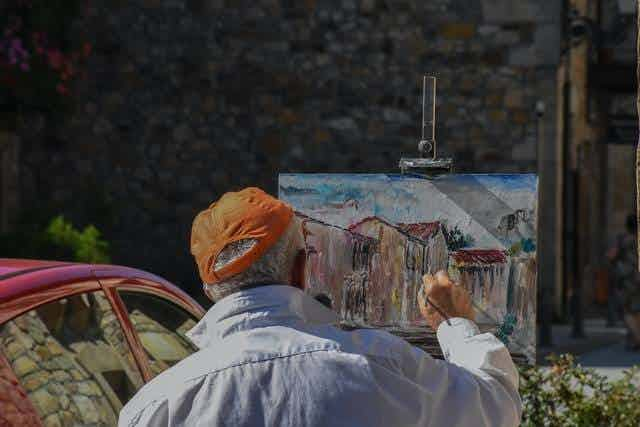There are many options for socially isolated people looking to take up a new hobby. Whether you want to find an activity to help you meet new people or one you can do on your own, you’re bound to discover something you enjoy.
What is social isolation?
Social isolation is a lack of social contact. While it can affect anyone, studies show half of adults aged over 60 are at risk of social isolation. This is because older people are more likely to experience situations that lead to fewer social connections, such as:
- Living alone
- Losing family or friends
- Mobility issues
- Chronic health problems
If you feel socially isolated and unhappy, there’s help available. Organisations like Age UK and the British Red Cross have dedicated pages with local resources and advice.
Loneliness vs social isolation
Social isolation is different from loneliness, which is the negative feeling we get when we’re unhappy with our relationships (usually the quality or quantity). So although the ideas are linked, they’re not the same.
One person might have little social contact and be perfectly happy. In contrast, another person would feel lonely in the same situation. For this reason, the list of hobbies below includes activities you can do alone and activities that will help you meet people.
For more about loneliness, see our loneliness pages.
11 activities for isolated older people
Whichever activity you take up, it's essential to choose something you enjoy. Hobbies should be something to look forward to, not another chore!
1. Join a book club
Book clubs are famous for their social side. While some focus on intellectually analysing a novel, others are an excuse for a good natter. Finding the right book club might take a little research, but it will be enriching when you join.
If you’re not able to get out and about, or you can’t find anything in your local area, why not join an online club? There are many celebrity-hosted International book clubs on social media platforms like Instagram. Reese Witherspoon, for example, picks books with women at the centre for her book club.
Marianne Chala from The Willoughby Book Club told Age Times: "You’re never alone with a book, and book clubs delivered to your door such as ours can also provide a sense of kinship and caring from afar. I’m also a great advocate for libraries and the wealth of information, escapism and also community that libraries provide is probably unrivalled."
2. Take up a sport
According to Sport England, 27% of 55 to 74-year-olds are inactive, rising to 49% of over 75s. The NHS website recommends that all adults aim to be physically active every day, even if it's just light activity.
Specifically, adults over 65 should do activities to improve strength, balance, and flexibility at least two days a week. Your GP can advise if you have any questions or concerns about exercising.
It’s hard to argue with the health benefits of staying active. Regular exercise can reduce the risks of major illness, including heart disease and stroke. Not to mention the extra endorphins released, helping you feel mentally better, too.
Sports don’t have to be all about fast running and super strength. Many communities have local walking clubs, Tai Chi lessons, and swimming sessions. Some councils even offer subsidised leisure centre access, making exercising even more affordable.
For ideas about improving your exercise regime, have a look at our staying active pages.
3. Adopt a pet or work with wildlife
Adopting a pet is a big responsibility, but you will gain a new best friend! If you’re considering getting a new furry friend, it’s a good idea to get in touch with your local animal shelter. They can advise on suitability and eligibility for adoption.
If you have experience with pets but can’t commit full time, why not foster? Foster animals usually come from difficult backgrounds and need a little time in a homely environment to acclimatise before being adopted. For more information, have a look at the RSPCA website.
Alternatively, wildlife charities often offer the chance to participate in programs and voluntary groups. The Wildlife Trust studied the impact of their own volunteering programmes on mental well-being. They found that 95% of people with low mental well-being at the start of volunteering reported improvements within six weeks.
4. Volunteer locally
We recently published an article about how to make a difference where you live. From checking in with neighbours to joining and a neighbourhood clean up, there are plenty of ways to connect with your local community and improve the area.
You could also look on your favourite charities website to see if they organise any local groups. Alternatively, there might be ways to volunteer online through fundraising or helping people with digital skills. However you choose to volunteer, becoming more connected with the community should help to ease feelings of isolation.
5. Give mindfulness a go
When you spend a lot of time on your own, it’s easy to get wrapped up in the small things. Negative thoughts and feelings cycle around with little distraction. Mindfulness is a technique that helps you focus on the here and now, staying in the moment.
The activity has gained a lot of popularity in recent years, perhaps in part thanks to how accessible it has come. Apps like Headspace train listeners to meditate in small time increments.
Mindfulness doesn’t take up more than a few minutes of your day. Eventually, the calm, content feeling will begin to stay with you beyond your meditation time. Headspace also has specific courses such as meditation for loneliness and stress relief.
6. Become green fingered
Gardening is a versatile hobby. You can potter around and water a few plants or grow award-winning vegetables. How much you do is entirely up to you. If you enjoy being surrounded by nature, why not create a wildlife garden that offers refuge and protection?
For the more avid gardeners, renting an allotment offers the chance to meet new friends, build your skills, and socialise with like-minded gardeners. To find out more, visit your local council’s website. There might be a waiting list, so it’s a good idea to put your name down soon if you’re serious!
7. Take up photography
You don't need to buy professional equipment to start a photography hobby. With a bit of research and a smartphone camera, you'll be taking beautiful snaps in no time. Photographing nature is a great way to get out of the house, and you might even be able to find a local photography club to join, too!
If you’d prefer a little guidance, local colleges often offer photography evening classes or short courses for adults. There’s also plenty of information on YouTube and blogs.
8. Join an adult education class
When you haven't been in education for a while, the idea of joining a class might be daunting. But one benefit of learning as an adult is that you get to choose what, how, and when you learn. You’ll meet classmates and build new skills at the same time.
Many colleges and local councils offer adult education classes. These cover everything from functional skills to foreign languages, from sewing to history. Organisations like the WEA specialise in adult learning, too. Course prices vary depending on the provider, whether you’re working towards a qualification, and how regularly the classes run.
If you can't find anything you like the look of locally, or if you struggle to attend regular classes in person, why not look into remote classes? Online learning went through rapid changes during the pandemic. Now, many new institutions are equipped to deliver online classes to a high standard.
9. Try your hand at art
Creative activities have been linked to improved mental health and reduced social isolation. Anyone can get creative; you just need the right tools! You might decide to start sketching with a simple pencil and paper, invest in a paint set, experiment with mixed media, or try your hand at pastels.
Think about what inspires you and the types of art you like to look at. It can be frustrating while you're getting started and working out how to get a specific desired effect or how to work with particular mediums. But the results will be fantastic. You can invest in a beginner’s guide book to give yourself the best possible start. Even if you don’t produce professional quality artwork, the process can be extremely fun!
10. Try gaming
The world of gaming isn’t just for teenagers locked away in their bedrooms! As technology improves and demand increases, all manner of games are released for new audiences. Best of all, you don’t need to have a gaming console. Many games are released as mobile apps or PC downloads.
Online gaming, in the right circumstances, can be very social. We recently researched four online games suited to beginner gamers over 50, including puzzles.
Remember, if you're new to the world of online gaming, you need to be extra careful about safety. It's essential to think about privacy settings, sharing personal information, unkind players, and in-game purchases. Sometimes, games offer the option to use real money to buy things in the game.
If you’re not sure, stick to simple games you can play with friends or stay offline. For more information, have a look at online gaming safety advice.
11. Improve your cooking skills
Hobbies aren’t necessarily brand-new activities. You might already have a hobby without realising it! Most of us can cook a simple dish or two. If you enjoy cooking, why not take an intermediate cooking course or organise a local baking club?
Turning a necessity into a hobby means dedicating time to it. It’s a good idea to schedule this in or get into a regular habit. For more advice on how to get started with cooking as a hobby, see our quick guide.
What to look for in a new hobby
If you're taking up a new hobby to reduce social isolation, there are certain things to look for. Group activities will increase your chances to meet new people and create lasting friendships, but some groups are more suitable than others. For example, how accessible is the group? What difficulty level is the activity?
The Lancashire government website lists tips for group organisers who want to maximise their potential in reducing loneliness and isolation. Putting these tips together, we can also see what makes a good group for attendees:
Accessibility
Can you easily get to the group? If you don't drive, then is it on a good bus route, and does the group operate within convenient bus times? Is the setting appropriate for you if you have mobility issues?
What you learn
Does the group promote learning and creativity? Will it be engaging and help you stay active?
Length
You want to progress and create a routine around your new hobby, so the best groups accommodate various levels and continue for several months. Research also shows that group activities lasting three months or longer have the most significant impact on social isolation.
How to take up a new hobby
If you’ve never tried a particular activity before, how will you know if you like it? Well, you could watch YouTube tutorials, research the activity online, or read blogs. But ultimately, you might not know whether the activity is right for you until you start.
There’s also no pressure to get it right the first time. You can always decide to try something else instead. For that reason, it's best to limit initial costs. Beginners don't usually need the best equipment when they start out, and if you're on a budget, some hobbies have lower start-up costs than others.
For example, if you decide to learn a language, you can start on a free app before signing up for classes or buying books. If you choose to take up painting, look for deals or beginner's kits. However, it's essential to research and make sure that whatever you're buying is still good enough quality.
Also, not every hobby is inherently social. But there are ways to meet people who enjoy the same activities. Facebook group organisers often centre the group around a specific activity, Meetup hosts adverts for local hobby groups, and community boards are another excellent source of information.
Here at Age Times, we regularly publish ideas and tips for new hobbies. Have a look at our dedicated pages and follow us on social media for the latest updates.








